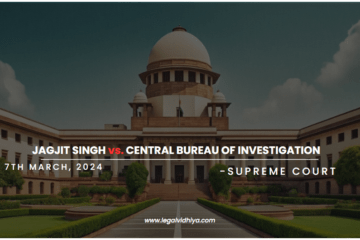
Shraddha Meghshyam Velhal Appellant
Versus
State Of Maharashtra Respondent
Facts of the Case
The applicant is the complainant in a case under the Protection of Children from Sexual Offences Act, 2012 (the Children Act). Upon her complaint the accused was produced by Nizampura Police Station before the Court of learned J.M.F.C., Bhiwandi for remand. The applicant made an application taking exception to the remand proceeding before the learned Magistrate on the ground that only the special Court constituted under the Children Act would have jurisdiction to take remand and pass any order under the Act. That application came to be rejected under the impugned order by the learned Magistrate on the ground that the act of remand was a precognizance stage when the learned Magistrate was not barred from passing any order.
Issues Involved
- Whether JMFC has the jurisdiction to take POCSO cases?
- Why POCSO cases are dealt in special court?
- Whether as mentioned by the JMFC Magistrate that any court can interpret in POCSO cases?
Contentions of petitioner
The petitioner contented that all the applications upon her complaint must be made only before the Children Court and consequently the first production of the accused for remand also must be before the Children Court as that Court alone is empowered to take cognizance of the offence even before the case is being committed to it for trial by any Magistrate.
Contentions of respondent
The respondent the Magistrate of JMFC on the ground that the act of remand was a precognizance stage when the learned Magistrate was not barred from passing any order and he rejected the application made by the petitioner.
Legal Provisions
- Section 19(6) of POCSO Act
- Section 4(2) of CrPC
- Section 167(2) of CrPC
- Section 190 CrPC
- Section 31 of POCSO Act
Legal Reasoning
Section 19(6) of POCSO Act
The Special Juvenile Police Unit or local police shall, without unnecessary delay but within a period of twenty-four hours, report the matter to the Child Welfare Committee and the Special Court or where no Special Court has been designated, to the Court of Session, including need of the child for care and protection and steps taken in this regard.
Section 4(2) of CrPC
All offences under any other law shall be investigated, inquired into, tried, and otherwise dealt with according to the same provisions, but subject to any enactment for the time being in force regulating the manner or place of investigating, inquiring into, trying or otherwise dealing with such offences.
Section 167(2) of CrPC
(2) The Magistrate to whom an accused person is forwarded under this section may, whether he has or has no jurisdiction to try the case, from time to time, authorise the detention of the accused in such custody as such Magistrate thinks fit, for a term not exceeding fifteen days in the whole; and if he has no jurisdiction to try the case or commit it for trial, and considers further detention unnecessary, he may order the accused to be forwarded to a Magistrate having such jurisdiction: Provided that-
(a) the Magistrate may authorise the detention of the accused person, otherwise than in the custody of the police, beyond the period of fifteen days; if he is satisfied that adequate grounds exist for doing so, but no Magistrate shall authorise the detention of the accused person in custody under this paragraph for a total period exceeding, –
(i) ninety days, where the investigation relates to an offence punishable with death, imprisonment for life or imprisonment for a term of not less than ten years
(ii) sixty days, where the investigation relates to any other offence, and, on the expiry of the said period of ninety days, or sixty days, as the case may be, the accused person shall be released on bail if he is prepared to and does furnish bail, and every person released on bail under this sub- section shall be deemed to be so released under the provisions of Chapter XXXIII for the purposes of that Chapter;]
(b) no Magistrate shall authorise detention in any custody under this section unless the accused is produced before him;
(c) no Magistrate of the second class, not specially empowered in this behalf by the High Court, shall authorise detention in the custody of the police.
(a), the accused shall be detained in custody so long as he does not furnish bail.
(b), the production of the accused person may be proved by his signature on the order authorising detention.
Section 190 of CrPC
Cognizance of offences by Magistrates.
(1) Subject to the provisions of this Chapter, any Magistrate of the first class, and any Magistrate of the second class specially empowered in this behalf under sub- section
(2), may take cognizance of any offence-
(a) upon receiving a complaint of facts which constitute such offence;
(b) upon a police report of such facts;
(c) upon information received from any person other than a police officer, or upon his own knowledge, that such offence has been committed.
(2) The Chief Judicial Magistrate may empower any Magistrate of the second class to take cognizance under sub- section
(1) of such offences as are within his competence to inquire into or try.
Section 31 of POCSO Act
The provisions of the Code of Criminal Procedure, 1973 (2 of 1974) (including the provisions as to bail and bonds) shall apply to the proceedings before a Special Court and for the purposes of the said provisions, the Special Court shall be deemed to be a court of Sessions and the person conducting a prosecution before a Special Court, shall be deemed to be a Public Prosecutor.
Judgement
In High Court of Judicature at Bombay, dated 08.07.2013) has taken a view that all the remand proceedings have to be dealt with only by a special court and magistrate has no jurisdiction at all. It took support from the statement of objects and reasons for enacting the POCSO Act which says that special court is to be established for trial of such offences and for matters connected therewith or incidental thereto and that the Act is enacted for safeguarding the wellbeing of child at every stage of the judicial proceeding. This can hardly be accepted for holding that it provides different procedure for remand so as to bring the same within the exception of Section-4 and 5 CrPC.
written by Shibin intern under legal vidhiya



![GLOBAL CREDIT CAPITAL LIMITED & ANR. v. SACH MARKETING PVT. LTD. & ANR. [2024]](https://legalvidhiya.com/wp-content/uploads/2025/03/image-35-360x240.png)



0 Comments